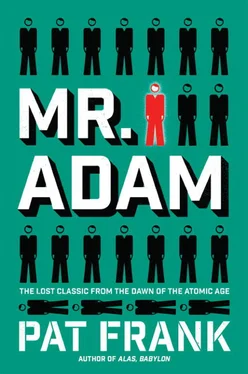“Oh, Mr. Smith—”
“Never, so help me Christ!”
“But you don’t understand, Mr. Smith. If you don’t answer the memoranda, or at least initial them, the files would never get cleared! You see, here’s the way it works. Suppose Mr. Klutz sent you a memo.”
“God forbid!”
Jane went on persistently and patiently. “Well, suppose Mr. Klutz sent a memo to Mr. Gableman, for action, with copies to you and the other members of the Planning Board for information. Well, until everybody has done something about that memo, it hasn’t been cleared up or settled, and the file clerks cannot put it in the files.”
“It floats around in a kind of limbo?”
“Yes, exactly.”
“Unless I initial a memo it can never die?”
“It can never die, Mr. Smith. It just keeps coming back to you and coming back to you from the communications section, and they write covering memos to you calling your attention to the first memo, and so on, and this complicates things. Please, Mr. Smith, I hope you will do something about this, because if you don’t people will think I’m inefficient, and I’ll get some kind of bad report on my 201 file, and I’ll never be able to get my classification changed.”
She appeared solemn, and a bit pitiful, and she was obviously such a nice girl. “I’ll make a deal,” I said. “You learn to make my initials, and you initial every memo that comes to the office. That’s all you have to do.”
“Won’t you ever read any of them?”
“Never!”
“Well, certainly you’ll read some of the directives. Everybody reads the directives, because they’re classified secret.”
“Never!”
Jane Zitter shook her head. “Oh, dear, Mr. Smith, the N.R.P. is such a strange organization, and you are such a strange man! Sometimes I think I should never have left Interior. I get six hundred more with N.R.P. than I did with Interior, and I thought working with N.R.P. would be more progressive, and advanced, and even exciting. But I never thought it would be anything like this.” She looked again at my red pajamas. “I suppose you’re crazy,” she reflected, “and I’ll probably get into trouble, but I won’t let you down.”
I remembered Homer, in his bedroom down the hall, and wondered whether I’d fed him enough drinks to afflict him with a hangover. Jane seemed to anticipate my question. “Mr. Adam,” she said, “went out.”
“Went out?”
“Oh, yes. He went out an hour ago. I told him I didn’t know whether he should or not, but he said you had said he could do anything he pleased. And out he went.”
“Did he say where?”
“He said somebody had called and he had made an engagement to discuss archeology. He didn’t say where or with whom. He just said, ‘I’m going to see a person about archeology.’ He appeared very happy about it, and chipper. He even tried to comb his hair.”
“Oh, my,” I said. “He’s been kidnaped by The Frame!”
“The Frame!”
I scrambled out of bed. “Either turn your head or go into the next room,” I told Jane. “We’ve got to find out what this is all about.” She apparently didn’t think I was especially dangerous, because she simply turned her head.
I dressed in a hurry, although I wasn’t actually worried. As a matter of fact, the thought of Homer being interested in The Frame was in some ways encouraging. At least one inhibition was breaking down, and for a man in Homer’s position, such an inhibition was not good for the soul. Further, it seemed a good sign that his lethargy and despondency could be cured. He could go out with The Frame if he wanted—so long as complications didn’t develop. However, I wasn’t going to allow any Hollywood press agent to use Homer for creating headlines. If Homer found relaxation and a measure of escape with The Frame, it was one thing. But as a publicity stunt, it was out.
I called the Press Club, located Finney, and got him on the phone. “Look, Oscar,” I said, “that bimbo of yours is out with my boy Homer, and it smells ungood.”
“Oh, is that where she went?” Oscar said. “I’ve been trying to reach her all morning, because I’m going to New York.”
“You know damn well that’s where she is,” I said.
“No. Honest, Steve, I didn’t.” He sounded like he was telling the truth.
“Oscar,” I warned him, “don’t try to pull any stunts with Adam. This business is too fundamental to mess it up just for the sake of a little publicity.”
Finney hesitated a moment before he answered. Finally he said, “Steve, I’ll lay it on the line. Kathy herself suggested it would be a smart pitch to hook her up with Adam. She’s been after me about it for days. Last night when I saw you and Adam in the Blue Room I thought I’d go ahead with it. Then I thought, no, I’d better not. For one thing, from now on Kathy’s got to make her name on the screen, and not in the papers. And it might have bad repercussions, especially with the women. She’s not too popular with the women now, for a number of obvious reasons, and if it looked as if she were trying to snag the only whole male on earth, she might get decidedly unpopular. You saw how that amateur Borgia acted last night. I told Riddell to lay off. I told her that grabbing Adam would be like stealing the U.S. Mint, and it would be bad box office. So she said okay, and if she’s out with Adam, then it’s news to me. Do you know where they are?”
“Haven’t the foggiest notion,” I said, and added, “Don’t get me wrong. I don’t mind Homer seeing Kitty—or Kathy—so long as it doesn’t break into print. It might be good for Homer.”
“Have you ever seen a pregnant starlet?” Oscar inquired.
“Don’t worry,” I reassured him, “Homer is shy and harmless. Nothing like that is going to happen.”
“Riddell isn’t harmless,” Oscar said. “Furthermore, she might get ideas. All the women seem to be crazy nowadays. There are plenty of girls out on the Coast who wouldn’t think of spoiling their figures by having babies when babies could be begat by their own husbands with no trouble at all. Now that they can’t have ’em, they all want ’em.”
I told Oscar I would be responsible. It occurred to me that for a newspaperman who had always watched other people carrying the world’s burdens I was making myself responsible for a lot of things.
It wasn’t hard to locate Adam and The Frame, for as I pointed out he was not a person who could vanish into the stream of humanity without a ripple. The doorman at the Shoreham remembered that Mr. Adam had taken a cab to the Smithsonian Institute. Jane wondered why, and I told her about the archeological mating of Homer and The Frame.
At the Smithsonian we went to the South American annex. It was a good guess. We found Homer and the girl sitting on a stone bench, her tawny hair barely brushing his shoulder, staring steadfastly at what appeared to be a large and ornately carved stone altar. Behind them, glaring from the wall, was a horrid wooden mask, with tusks, which could frighten large adults.
I will say this for The Frame. She not only had a shape on which to hang clothes, but apparently she possessed an instinct for what clothes to hang on the shape. Now she looked as if she had just been voted the Best Dressed Senior in her college. I don’t recall exactly what she wore, except that it was something with a wide belt and a flaring skirt, and it gave her that collegiate look which blends so well with an interest in archeology.
“Hello, people,” I greeted them. “If you want to be alone I can think of more comfy places, without goons like that.” I nodded at the mask.
They didn’t appear particularly happy to see us. “I hope you don’t mind, Steve,” Homer protested. “You’re not going to be a Phelps-Smythe, are you? You said I could do whatever I wanted, you know.”
Читать дальше












